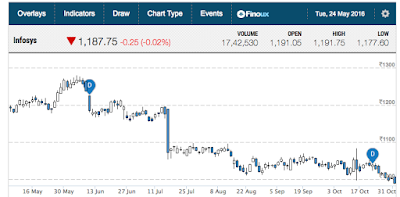 |
| Picture shows a person engaged in trading in stocks |
Actual Question:
How does Warren buffet analyse companies for trading?
Answer
Dear
Friend
Thank
you for an insightful question.
Your
question has two distinct parts:
1.
How Warren Buffett, Chairman Berkshire Hathaway, analyses companies
2. How does he employ the findings for trading.
The
factual answer is that Warren Buffett does not indulge in trading in stocks and he analyses companies based on
value-investing principles, propounded by Benjamin Graham in two books:
1.
The Intelligent Investor
2.
Securities Analysis
In
a nutshell value-investing is about:
- Identifying wonderful companies that have strong and unshakable franchise like brand and product excellence - examples Gillette and Coca-Cola;
- Determining the intrinsic values of shares of such companies;
- Buying those stocks below their intrinsic value or maximum at par - ideally during unjustifiable market lows like the post Lehman Brothers collapse;
- Holding the investments intact for decades, reaping regular dividends and letting the original capital appreciate significantly;
- Maybe, sell those highly capital appreciated investments during unjustifiable market highs like during the period just before the Lehman Brothers collapse, investing the proceeds in regular income generating instruments like bonds, which again are bought at a discount, till the time again the markets turn unreasonably pessimistic.
 |
| Picture of the book "The Intelligent Investor" by Benjamin Graham |
Coming
back to the second part of your question, you might have already realised by
now, from the above explanations, that Warren Buffett, Chairman Berkshire Hathaway, does not indulge in trading -
meaning intra-day or short-term trading - which is based
purely on expectations of short-term price rises and slides. In fact day-trading and margin trading
Suggested
further reading:
- How to Calculate the Intrinsic Value Shares?
- Intrinsic Value As Described by Benjamin Graham Video
- Margin of Safety
- Market Fluctuations Are Investor's Friend
- Day Trading Definition
- Margin Trading Definition
Thank
you,
With
best regards,
Anand




